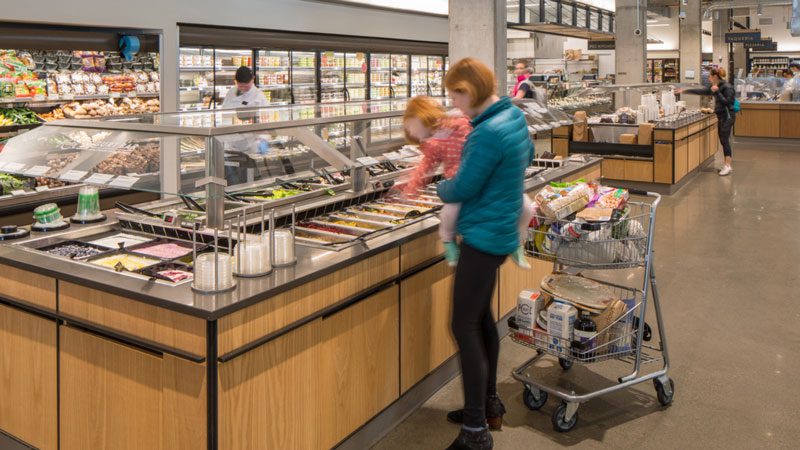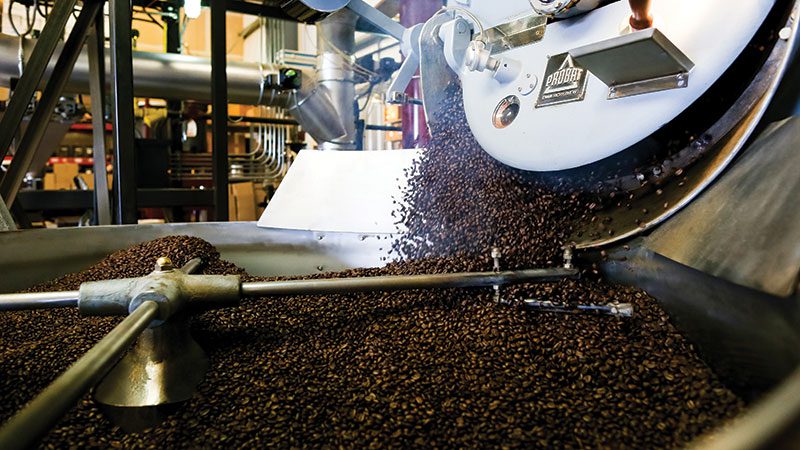Wallet Wellness: PCC’s Value and Values
This article was originally published in January 2024

Wallet Wellness: PCC’s Value and Values
Our entire community has felt the impact of higher food prices lately. Customers and retailers alike are struggling to balance budgets strained by inflation, supply chain disruptions, extreme weather and other global crises spiking food costs over the past few years. At PCC, we know that our members and customers deeply appreciate the quality of the products we sell, and how we treat people, animals and the planet in getting those items from wherever they’re made, raised or grown to our shelves. As we work hard to lower prices wherever possible to help you find value at PCC, we are also committed to transparency that educates our shoppers about the true cost of the products we sell while also helping them know how to make the most of their budget when they shop with PCC.
For many years, we have received a steady stream of feedback and questions about prices. Most PCC customers understand that products meeting PCC’s standards will often cost more than conventional products. For instance, organic products that are better for people and the planet typically cost more. All PCC bananas (the most popular fresh fruit in the United States) are not only organic but are purchased through Organics Unlimited’s Giving Resources and Opportunities to Workers (GROW) program that supports education, clean drinking water and other benefits in the communities where the bananas are grown. The bananas taste great, they are a rare sustainable choice for a fruit commonly flagged for environmental and human rights abuses—but they are not the least expensive bananas available.

Similarly, Tony’s Coffee, which supplies PCC’s private label coffee, gets glowing reviews for its exceptional flavor. Backing that excellence is Tony’s commitment to sustainability—its organic, fair trade, shade-grown coffee is purchased from small-scale farmer cooperatives and roasted in a carbon-neutral plant that uses renewable energy. The coffee’s price tag is a good value given Tony’s quality and policies, but companies that don’t pay extra for quality ingredients and sustainability are able to charge shoppers less.
While our customers tell us that they appreciate the opportunity to purchase products that align with their values, we also know that we must find ways to offer great value across the stores to ensure that customers can manage their budgets while shopping regularly with PCC.
As the aftershocks of the COVID-19 pandemic began fading and inflation rates started leveling, the co-op recommitted to rigorous and consistent efforts to offer fair and competitive pricing in all departments, said Gabrielle Taylor, PCC’s senior manager of pricing and promotions. Staff members are reviewing our pricing item by item—with more than 16,000 products on PCC shelves—“to ensure that our prices make sense in the context of other grocers in the region and that we make the highest-quality food as accessible as possible to the greatest number of people.”
Shopping for value at PCC:
- Look and ask: If you haven’t comparison-shopped lately, PCC’s recent price reductions might be eye-opening. The co-op has adjusted prices on hundreds of items recently, starting with top sellers in produce, meat and seafood. Scan the shelves and you’ll also see new red price tags noting items on sale. If prices on a specific product seem out of line, shoppers should feel free to send the team a note at customerservice@pccmarkets.com. That specific price might be due to factors beyond the co-op’s control—as a Pacific Northwest grocer with 15 stores, PCC doesn’t receive the discounts that national corporations enjoy. However, in other cases, there are reasons behind an outlier high price that we can identify and change.
- Be a member: Join the co-op for a one-time $60 fee. PCC sends out regular, member-only discounts and deals totaling more than $250 each year. We offer discounts with dollars-off purchases for members who want to choose where they want to use the discounts and offer additional discounts and free offers for specific items. Members also receive discounts at dozens of independent community partners.
- Shop sales: Watch for “Deal of the Day” signboards outside stores spotlighting a deeply discounted item that is available for a limited time. PCC also lists dozens of weekly specials on its website here and mails coupons to shoppers’ homes as well as offering occasional coupons in the Sound Consumer.
- Case in point: PCC offers a 10% discount on many items when purchased by the case (full cases of beer and spirits taken directly from the shelf are among items that do not qualify for the discount). Items can be pre-ordered by the case as well at any store. The exact number varies by the item; for wine, for instance, PCC offers the 10% discount when shoppers purchase any four bottles together.
- Pick and choose: While exact prices fluctuate, PCC is consistently a bargain on certain foods. PCC carries the Field Day brand of U.S. Department of Agriculture (USDA) organic, non-GMO certified products. The value-priced line is a good choice for pantry staples. Other reliable bargains include PCC’s private label organic milk, which at the writing of this piece is half the price of comparable quarts of organic milk at other regional grocery stores. The delicious whole organic-crust pizzas at PCC delis, already cheaper than others in the region, cost the same regardless of the number of toppings or customizations. Exclusive offers in our beer, wine and spirits department often are far less expensive at PCC than other stores, as they are imported directly rather than going through distributors.
- Buy bulk from our large selection: PCC was founded in 1953 as a money-saving bulk buying club, and bulk ingredients and supplies remain a substantial and economical department in every store. PCC stores generally carry more than 400 bulk items at each location, offering bulk items that many other stores do not, from staples like grains and specialty flours and spices to body care items like liquid soap and Epsom salts. Again, while exact prices fluctuate, at the writing of this piece, bulk organic thick-cut oats cost $1.49 per pound in PCC bulk bins but $5.10 per pound in commercially packaged two-pound bags. Organic extra-virgin olive oil was $6.89/pint in bulk compared with $15.36/pint for a bottle of the same brand, an ounce of bulk organic cinnamon was 69 cents compared to $2.65 per ounce by the bottle.
- Serving all shoppers: We know that many people in our region and country have no option but to choose the price tag that’s lowest. That’s one reason PCC advocates for local, state and federal policies that will broaden accessibility to high-quality food. We want PCC standards to be the affordable norm, not the exception. As one of many practical steps toward this goal, PCC gladly accepts SNAP benefits the USDA Supplemental Nutrition Assistance Program, formerly known as food stamps) at all 15 stores. All children, regardless of income level, are invited to enjoy a piece of free fruit on every visit to PCC.
Shopping your values
Most price tags don’t show the true cost of food. A 2021 report by the Rockefeller Institute, researched even before the last few years of severe inflation and pandemic-related increases, pegged the real cost of food in the U.S. as triple the retail price. Diet-related disease, greenhouse gas emissions and biodiversity impacts, environmental effects, unlivable wages and safety costs all contributed to that gap.
“It’s important to remember that PCC pays for the ‘real costs’ of the way that food is produced and gets to our shelves, and those costs are represented in our prices,” said Justine Johnson, PCC’s senior director of merchandising.
PCC invests heavily in local, organic, independent farmers and small local businesses. We bar products that are known to be harmful to the health and well-being of workers, consumers, animals and the environment. In just a few examples among hundreds, PCC banned high-fructose corn syrup from its products more than 15 years ago, before most conventional chains even understood the risks associated with it. The co-op doesn’t allow harmful artificial preservatives, colors, flavors, sweeteners, or products of nanotechnology in goods it sells. PCC only stocks chocolate from producers who do not use child slave labor (a consistent horror of the global chocolate industry). We bar the use of gestation crates for pigs, developed our own animal welfare standard for eggs, and worked directly with family-owned Wilcox Farms to introduce mobile hen houses creating a new line of pastured eggs. We developed our own standard for Chinook salmon to help protect Southern Resident killer whales, and the majority of our seafood comes from the U.S. to avoid the exploitive, abusive and environmentally disastrous fishing practices that are standard in many other parts of the world. PCC does not allow aerosol sprays or microbeads, which have been linked to climate change and plastics pollution. See our full standards here.
It’s important to note that “The price you’d pay at other grocers doesn’t include externalized costs; those costs lie on the shoulders of the farmworkers that frequently aren’t paid well, on the animals that are treated poorly, or through environmental impacts,” Johnson said.
PCC prioritizes local, independent farms: an important source of food security and stability as well as an environmental benefit. However, these relationships can also be costly due to our region’s high cost of living and ever-rising land prices. Once fair wages for workers and practices such as organic certification are added in, it adds up.
It is significantly less expensive to use chemical pesticides on crops, to pack animals into crates that don’t allow them room to turn around, to not ask questions about where and how seafood is caught, to use cocoa linked to human trafficking and child labor. But PCC members have typically made a longer-term investment whenever they were able, knowing that good food is essential to good health, both for people and the planet.
Investing in community
As a member-owned co-op, PCC is deeply invested and involved in each of the 15 communities where we have stores.
Unlike the majority of grocery stores, which are owned by corporations that answer to Wall Street demands, PCC was founded in the Seattle area 71 years ago and remains independent and member owned. As a co-op, we are accountable to our members and dedicated to serving our region: supporting local farmers and producers, food banks, environmental policies and much more.
“When you spend your money at the co-op, you are supporting the community… your money stays here in our community,” Taylor said.
One influential study by American Express concluded that 67 cents of every dollar spent at a local retailer will stay in the community, vs. 45 cents for each dollar spent at a national or global chain. In a phenomenon known as the Local Multiplier Effect, money spent at a locally owned and independent business recirculates through the local economy two to four times more than money spent at a non-local company. Since its earliest days PCC stores have prioritized local suppliers.
When we buy produce from a local farm or soap from a local producer, for just two examples, that money supports local jobs and businesses and farmland.
PCC prioritizes hiring locally and promoting workers from within the company, and its benefits include a generous medical, dental and vision insurance plan at a low cost to workers.
PCC regularly provides nutritious food to neighborhood food banks near each of our 15 stores. Our grant programs support farmers—especially those that have been historically disadvantaged—as well as organics. Many years ago, we founded the PCC Farmland Fund, now the statewide Washington Farmland Trust, and we remain a committed supporter.
Members and shoppers also directly support the community through donations of money and/or time to PCC’s Purpose Program. This practice led to groundbreaking initiatives like the Growing for Good program, a partnership between PCC, Harvest Against Hunger, and the Neighborhood Farmers Markets Association. With more than 40 food bank and nonprofit partners, the co-op is steadily working on ways to ensure that good food is accessible to everyone in our communities.
As a triple bottom line business, PCC prioritizes social and environmental responsibilities along with economics. Members and shoppers are PCC’s invaluable partners in these endeavors.
For more than 70 years, working together, we have saved farmland, supported organic foods and helped create a more sustainable world. We have used our collective voices and dollars to make a difference that none of us could make alone. We want to make it as easy, desirable—and affordable—for us to continue to create, support and serve thriving communities together.
Editor’s note: This article has been updated since publication. It originally said PCC’s deli pizzas are organic. While the crust and some other compounds of the pizzas are organic, they are not entirely organic.

